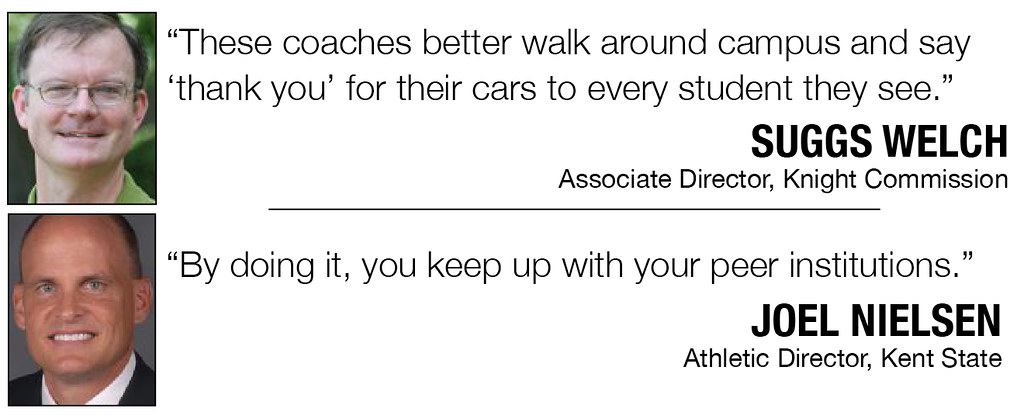MAC coaches receive cars as part of perks package
Just for being a head coach at a MAC school, you could drive around a brand-new, 2012 Ford Fusion.
That’s one perk Kent State offers all its head coaches and football and basketball assistants.
But Kent isn’t the only school to offer cars to their coaches, as all 12 MAC schools offer cars in some form, whether it is stipends or a lease as part of a contract with a dealership.
But the number of cars each athletic department varies significantly. For example, of the departments that give out courtesy cars, Central Michigan gives out the most at 38 and Kent State gives out 33, while others give out stipends to their coaches.
Car perk keeps some programs competitive
Focusing just on football and basketball, of the MAC champions in the past five years, out of the nine programs that won championships, four have one more than one: Central Michigan (2), Miami (OH) (3), Akron (2) and Bowling Green (3.) Three of the four programs provide all head coaches with courtesy cars, with Miami being the exception yet still giving out 30-35 cars to their coaching staffs.
While Kent State has excelled in men’s basketball, they haven’t seen that success translate into championships. But Director of Athletics Joel Nielsen says Kent State, which offers cars to all its head coaches plus football and basketball assistants, is keeping up with its competition by offering this program.
“It’s one of those competitive advantage situations where if we weren’t doing it, we’d be at a competitive disadvantage. So by doing it, you keep up with your peer institutions,” Nielsen says.
Athletic directors around the MAC echo his sentiment and many say they do it to keep their coaches within the conference.
“I think we would have some consideration by people that there might be better opportunities at other places so there’d be a chance that we could lose some of our better employees, our better coaches,” Nielsen says.
Tom Collins, Athletic Director at Ball State University, says coaches wouldn’t be able to effectively do their jobs without courtesy cars.
“Our employees would be hurt a great deal if the car incentive was eliminated,” he says.
Less successful programs refuse to talk about courtesy cars
But universities that haven’t achieved great success in the win column have taken a completely different approach to providing information about their courtesy car program.
Donna Turner, Associate Athletic Director for Communications at Northern Illinois, said, “Due to the amount of time that this class project has now required of different people in our department and in our university, which has included your filing a FOIA for documents we volunteered to provide after we had already answered many initial questions, no one in our athletic department will be available for an interview.”
That’s more of a response than Toledo gave.
Paul Helgren, Associate Athletic Director for Media Relations, said, “We have decided to respectfully decline your invitation to interview a member of our Athletics staff for your story.”
Toledo’s football program has finished with a winning season only twice in the past five years, and their men’s basketball team is coming off a four-win 2010-2011 campaign.
And despite back-to-back 11-win seasons for the Northern Illinois football program, their men’s basketball team has not won more than 10 games in a season in the past five years.
Is the balance between athletics and academics out of balance?
Officials at every athletic department were asked this question, and officials gave several different opinions.
Larissa Kowalczyk, Assistant AD for Business Operations at Buffalo, says it’s clearly out of balance. “You are getting a very good salary, shouldn’t you be able to afford your own car?”
Mike Malach, Associate AD at Eastern Michigan says the school hasn’t “encountered that phenomenon” between the athletic and academic divide, but did not give a direct answer to the question.
Nielsen’s sentiment follows Malach, saying, “I think we being in the MAC, we’ve got a good sense on how to spend money, how much money we need, how to fundraise and how to be responsible to the institution.”



